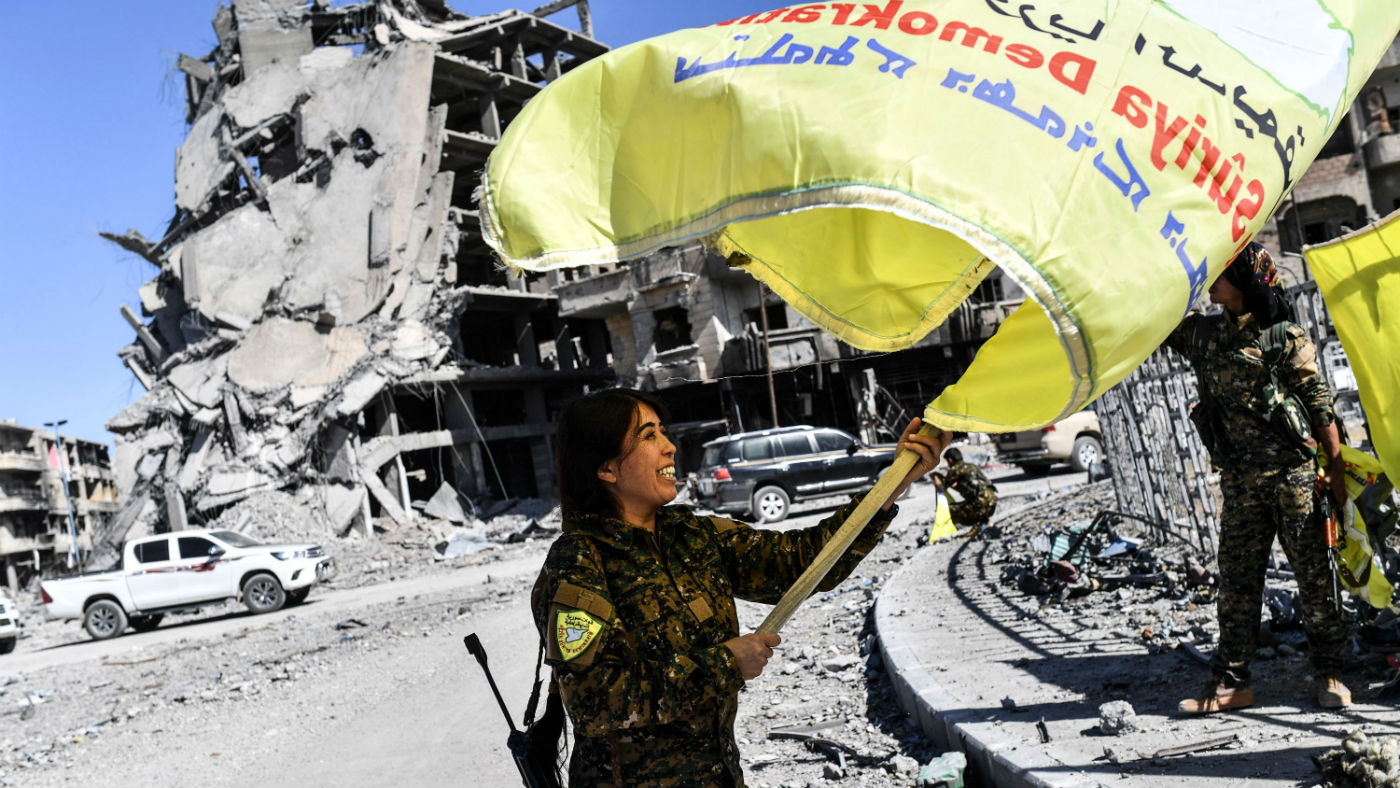Islamic State driven out of its ‘capital’
US-backed alliance captures Raqqa after five-month battle in symbolic blow to ‘caliphate’

A free daily email with the biggest news stories of the day – and the best features from TheWeek.com
You are now subscribed
Your newsletter sign-up was successful
American-backed forces have captured the self-declared capital of Islamic State, Raqqa, a major blow for the militant group as it fights for survival on all sides.
Syrian Democratic Forces (SDF), a US-backed militia of Syrian Kurds and Arabs, confirmed yesterday it had taken control of the northern Syrian city, which has been under IS control for over three years, after months of fierce fighting.
While US Central Command stopped short of declaring total victory yesterday, in a phone call to The New York Times, SDF spokesman Talal Sello said the military operation “is now over”.
The Week
Escape your echo chamber. Get the facts behind the news, plus analysis from multiple perspectives.

Sign up for The Week's Free Newsletters
From our morning news briefing to a weekly Good News Newsletter, get the best of The Week delivered directly to your inbox.
From our morning news briefing to a weekly Good News Newsletter, get the best of The Week delivered directly to your inbox.
UK-based monitoring group the Syrian Observatory for Human Rights estimates 3,250 people were killed in the five-month battle to retake the city.
Earlier yesterday, the SDF claimed it had cleared the last two major IS positions in Raqqa - the municipal stadium and the National Hospital.
Reuters news agency reported that fighters raised the flag of Popular Protection Units, a Kurdish militia that dominates the SDF, inside the stadium and celebrated in the streets and chanted slogans from their vehicles.
Al Jazeera’s Hashem Ahelbarra, reporting from Turkey, said clean-up operations were now underway after the bloody battle.
A free daily email with the biggest news stories of the day – and the best features from TheWeek.com
“Hundreds of SDF fighters, waving yellow flags, are now entering the city of Raqqa. They have killed dozens of fighters. They are deploying more troops in the city to try to clear mines, explosives,” Ahelbarra said.
“Destroyed and depopulated, Raqqa faces an uncertain political future,” says Mariya Petkova for Al Jazeera. The humanitarian Reach initiative estimates less than 1% of Raqqa’s 300,000 pre-war population remains in a city with no electricity or fresh water.
The US and SDF have pledged to hand over the city to civilian rule, “but the shape and political make-up of this civilian entity remain unclear [while] various ethnic, tribal and geopolitical factors will complicate the handover”, says Petkova.
Raqqa became the first major city to fall to IS fighters in early 2014, just months after it was captured from the Syrian government by rebels fighting in the civil war.
Declared the headquarters of a “caliphate”, Raqqa was “transformed by the group, which implemented an extreme interpretation of Islamic law and used beheadings, crucifixions and torture to terrorise residents who opposed its rule”, recalls the BBC.
The defeat of IS in Raqqa “is a symbol of the terror group’s decline”, says CNN. It now controls just a small strip of territory along the Euphrates river in northern Syria - and has no major city in its grip.
The Independent notes that “the city was used as a base for the group to plan attacks abroad” and its fall has prompted the New York Times to suggest IS “is already preparing for a new phase, morphing back into the kind of underground insurgency it started as, taking round among disaffected Sunni populations that were willing to tolerate, if not wholeheartedly embrace, its ultraconservative brand of Islam”.
-
 Local elections 2026: where are they and who is expected to win?
Local elections 2026: where are they and who is expected to win?The Explainer Labour is braced for heavy losses and U-turn on postponing some council elections hasn’t helped the party’s prospects
-
 6 of the world’s most accessible destinations
6 of the world’s most accessible destinationsThe Week Recommends Experience all of Berlin, Singapore and Sydney
-
 How the FCC’s ‘equal time’ rule works
How the FCC’s ‘equal time’ rule worksIn the Spotlight The law is at the heart of the Colbert-CBS conflict
-
 Epstein files topple law CEO, roil UK government
Epstein files topple law CEO, roil UK governmentSpeed Read Peter Mandelson, Britain’s former ambassador to the US, is caught up in the scandal
-
 Iran and US prepare to meet after skirmishes
Iran and US prepare to meet after skirmishesSpeed Read The incident comes amid heightened tensions in the Middle East
-
 Israel retrieves final hostage’s body from Gaza
Israel retrieves final hostage’s body from GazaSpeed Read The 24-year-old police officer was killed during the initial Hamas attack
-
 China’s Xi targets top general in growing purge
China’s Xi targets top general in growing purgeSpeed Read Zhang Youxia is being investigated over ‘grave violations’ of the law
-
 Panama and Canada are negotiating over a crucial copper mine
Panama and Canada are negotiating over a crucial copper mineIn the Spotlight Panama is set to make a final decision on the mine this summer
-
 Why Greenland’s natural resources are nearly impossible to mine
Why Greenland’s natural resources are nearly impossible to mineThe Explainer The country’s natural landscape makes the task extremely difficult
-
 Iran cuts internet as protests escalate
Iran cuts internet as protests escalateSpeed Reada Government buildings across the country have been set on fire
-
 US nabs ‘shadow’ tanker claimed by Russia
US nabs ‘shadow’ tanker claimed by RussiaSpeed Read The ship was one of two vessels seized by the US military